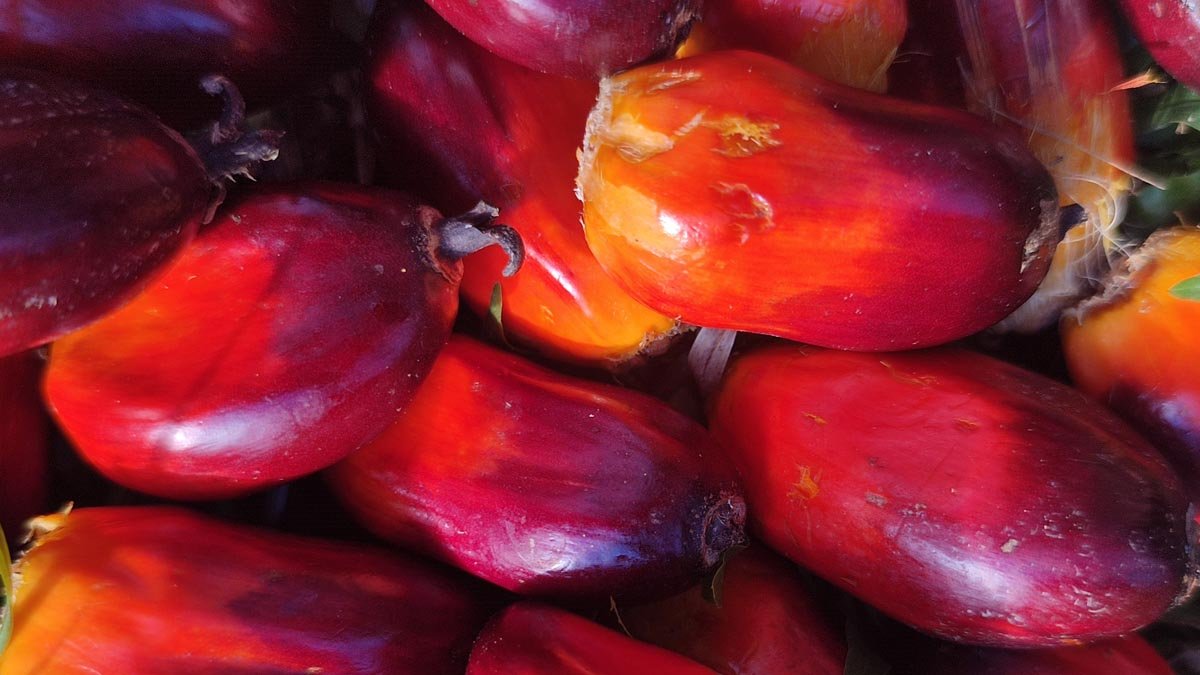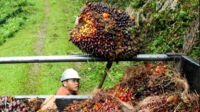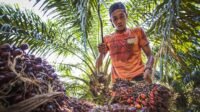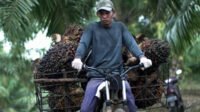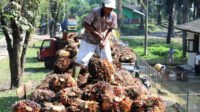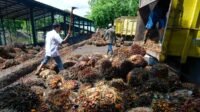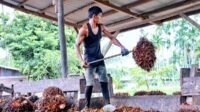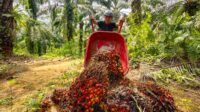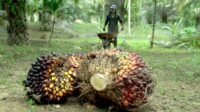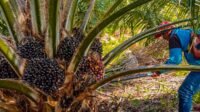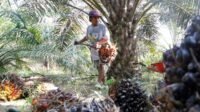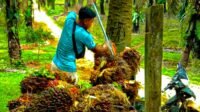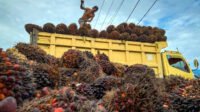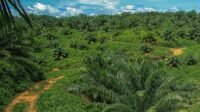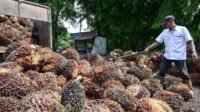PALMOILMAGAZINE, BOGOR – The implementation of the B40 biodiesel policy has yet to benefit palm oil smallholders, particularly in improving the price of fresh fruit bunches (FFB), according to Gulat Medali Emas Manurung, Chairman of the Indonesian Oil Palm Smallholders Association (APKASINDO). Speaking at the Palm Oil Downstream Industry Journalist Workshop in Bogor on Saturday (22/2/2025), he highlighted the significant decline in FFB prices following the policy’s introduction.
Gulat revealed that between January and February 2025, FFB prices have dropped sharply by IDR 550-600 per kg, with current average prices at IDR 2,450-2,500 per kg—down from IDR 3,000-3,800 per kg in the last quarter of 2024.
“With 12,500 hectares of oil palm plantations, smallholders are losing IDR 9 billion per month due to the price drop. If we consider the total productive plantation area of 4.12 million hectares, total losses reach IDR 2.96 trillion per month,” he explained.
Also Read: BPDP Supports Food and Energy Self-Sufficiency for Indonesia Emas 2045
The decline, he said, is linked to the issuance of Trade Ministry Regulation 02/2025, which tightens export administration for High Acid Palm Oil Residue (HAPOR), Palm Oil Mill Effluent (POME), and Used Cooking Oil (UCO). As a result, exports of these products have stalled, leading to domestic oversupply. Biodiesel producers have capitalized on this by using these materials as cheaper substitutes for crude palm oil (CPO) in biodiesel production.
“The key issue here is cost. HAPOR and POME are priced at IDR 9,000-12,000 per kg, significantly lower than CPO’s price of IDR 13,875 per kg. Biodiesel producers mix these cheaper materials but still base their pricing on CPO market rates, which could potentially harm state finances,” Gulat pointed out.
Impact on Smallholders’ FFB Prices
Gulat emphasized that biodiesel mandates were initially intended to stabilize CPO prices through increased domestic absorption. A rise in domestic CPO demand would reduce global supply, triggering price increases in accordance with supply-demand principles.
However, since the implementation of B40 in mid-January 2025, domestic CPO absorption has not increased as expected due to the substitution of POME and HAPOR. As a result, FFB prices for smallholders have continued to decline, averaging IDR 550-600 per kg lower than before.
Also Read: ESDM Accelerates Green Energy Transition and Palm Oil Biodiesel for National Energy Security 2025
“The funds used to cover the price gap between biodiesel and fossil diesel come at the expense of our FFB prices. With an export levy (PE) of USD 71.66 per MT of CPO in February 2025, smallholders are losing IDR 230 per kg. The burden always falls on the upstream sector—so of course, we are frustrated,” he said.
Urgent Policy Revisions Needed
To prevent further losses for both smallholders and the state, Gulat proposed three key actions:
- Audit the raw materials used by biodiesel producers to ensure transparency in their production processes.
- Establish reference prices for POME, HAPOR, and UCO to prevent excessive substitution.
- Review Trade Ministry Regulation 02/2025 to allow for a more balanced export policy.
“We fully support President Prabowo’s vision for energy self-sufficiency, budget efficiency, and revenue optimization. But why is the Trade Ministry not aligned with this policy? Exports generate foreign exchange, boost state revenue through export duties, and contribute to BPDPKS funds. Yet instead of facilitating exports, they are being restricted under the guise of ‘tightening regulations.’ What happens if no international buyers purchase HAPOR, POME, or UCO?” Gulat questioned.
Instead of restricting exports, he argued, the focus should be on boosting CPO production by increasing smallholder productivity. This could be achieved through smallholder plantation replanting (PSR) programs, which require significant funding from BPDPKS.
“BPDPKS has been fulfilling its role, especially since PSR funding was raised to IDR 60 million per hectare. However, the program’s strict requirements have limited its success, with only 30-40% of targets met annually. This is what ministries and agencies should be working together to resolve,” he urged.
As a closing statement, Gulat stressed the importance of mutual support within the palm oil sector.
“The key to sustainability is protecting large players while strengthening smallholders. Without this, the same problems will keep repeating,” he concluded. (P2)

